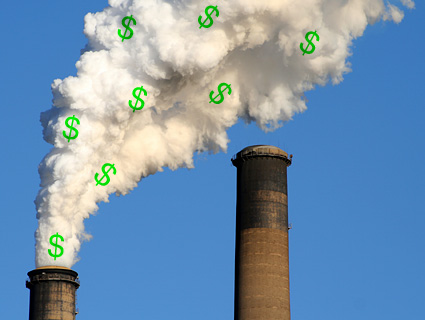
Carbon Trading Obsession is “Irresponsible”
 As the diplomatic squabbling continues in Cancun, lots of policy options are being put on the table.
As the diplomatic squabbling continues in Cancun, lots of policy options are being put on the table.
One of the key ones is trading carbon emissions.
The influential EU bloc is one of carbon tradings greatest proponents, with its Emissions Trading Scheme the largest carbon trading scheme in the world.
New rules to the ETS are likely to be announced this week.
However the concept is slammed in a report published today by the environmental group, Friends of the Earth.
FoE argues that the “current obsession with carbon trading as a primary tool for tackling climate change is high risk, irresponsible and dangerous.” .
FoE says that carbon trading is unreliable, unproven and burdens developing countries with unfair responsibility for tackling climate change.
Beyond this, FoE argues it is a “distraction from more viable, more equitable, more effective solutions for tackling climate change greenhouse gas emissions and providing adequate finance to developing countries for tackling climate change and adapting to its impacts”.
Ironically it says that carbon trading “rarely supports genuine low carbon development”, instead the “biggest financial beneficiary of carbon trading is the Northern carbon trading industry”.
Instead of carbon trading, FoE puts forward a number of solutions that it argues will radically reduce carbon emissions, and bring in the transition for an energy revolution, by making renewable energy “the default choice of the world as a whole”.
The FoE plan includes:
Energy: A global feed-in tariff programme with investment of US $100 billion per year over 15 years would bring down the costs of renewable technologies to a universally affordable level;
Agriculture: The expansion of small-scale, sustainable agriculture has the potential to bring about a dramatic reduction in global greenhouse gas emissions though reduced fossil-fuel use in agriculture and carbon sequestration in plants and soils;
Forests: Tackling emissions from deforestation and forest degradation necessitates measures to tackle the core drivers, most notably demand for agrofuels, meat and forest products;
Industry: To prevent polluting companies from using the threat of offshoring or so-called carbon leakage to avoid taking action, the starting point must be an agreement at the international level on the introduction of common standards on the use of best available technology;
Financial Transaction Tax: A new, global tax on cross-border financial transactions could generate additional government revenue of US $400 billion, including US $100 billion for climate finance;
Tackling tax evasion: Clamping down on tax avoidance in developed countries could provide significant additional government revenue;
Redirecting fossil-fuel subsidies: As readers of this blog will know, global subsidies for the production and consumption of fossil fuels are estimated at US $700 billion per year;
Carbon and energy taxation: An EUwide carbon tax and a graduated ‘Starter Tax’ in the United States could together bring in US $200 billion per year. Making only a quarter of this available for climate finance could provide more than US$50 billion per year;
Special Drawing Rights (SDRs): New allocations of SDR s, a reserve asset created by the International Monetary Fund, could be issued at approximately US $100 billion per year without leading to inflation.
“The only thing getting in the way of these and other fair and effective solutions to cutting greenhouse gas emissions is the current obsession with carbon trading as a solution to climate change” says FOE’s senior climate campaigner Sarah-Jayne Clifton.
She continues: “We need your help to stop expansion of carbon trading globally and to put pressure on governments to adopt these real solutions to the climate crisis.”
